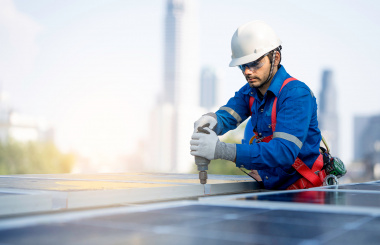Are you looking for a way to save money? Solar energy is a great way to do it. In this article, we’re going to talk about all the ways going solar can save you money.
First, let’s talk about the cost of solar panels. Solar panels have come down in price by 99% since 1976, making them a very affordable option for many people. In addition, solar panels have a 25-30 year warranty, so you can be assured that your investment will last for many years.
Cost of Installation, Maintenance, and Electricity
The cost of installation has also come down, making solar an even more attractive option. The average cost of solar installation is now around $18,000, which is a significant saving from the initial cost of installation.
Solar panels require very little maintenance, and the cost of maintenance is typically around $100 per year. This is a very small price to pay for the peace of mind that comes with knowing your solar panels are working properly.
Solar panels produce electricity, and the cost of electricity is very important to consider. The average cost of electricity is $0.12 per kilowatt-hour, and the average solar panel produces around 30 kilowatt-hours of electricity per year. This means that the average solar panel produces around $3.60 worth of electricity per year.
Rebates and Incentives
Solar panels come with a number of rebates and incentives, which can save you even more money. The federal government offers a tax credit of 30% of the cost of your solar panel installation, and many states offer additional rebates and incentives. Solar panels can be financed through a number of different solar financing options, which can save you money on the upfront cost of your solar panel installation.
Some Other Benefits of Solar Energy
- Solar is free once you have installed the photovoltaic (PV) panels on your roof or in your yard. The sun provides the energy, and the PV cell converts the sunlight into DC (direct current) electricity. This is then converted to AC (alternating current) by your inverter and is what powers your home. The excess electricity is sent back to the utility grid, and you get credit for it.
- Solar is good for the environment. Solar PV cells do not pollute the air or the water, and they do not produce carbon emissions. Fossil fuels such as coal and natural gas do produce carbon emissions, which are the leading cause of climate change.
- Solar is a hedge against rising utility rates. Electricity rates have been rising steadily for years, and they are expected to continue to rise. With solar, you lock in a low rate for the electricity you produce, and you are not subject to the rate increases.
- Solar can increase the value of your home. A solar PV system can increase the value of your home by as much as $20,000, according to the National Renewable Energy Laboratory.
- Solar can generate income for you. If you produce more electricity than you need, you can sell it back to the utility company at the retail rate. This is called net metering, and it is available in most states.
- Now that we’ve talked about all the ways going solar can save you money, it’s time to take action. Enter your zip code below to find out more about solar energy and how it can save you money.







Updated December 26, 2022